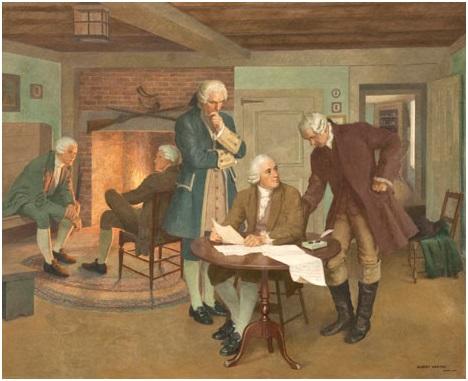- Trial Court Law Libraries

The series of Massachusetts Law Updates blog posts showcasing the 30 Articles in the Declaration of Rights in the Massachusetts Constitution, posted in January of 2019, would not have been possible had not the articles been drafted by John Adams at his kitchen table in Quincy, Massachusetts, during September and November of 1779. A debt of gratitude is owed to John Adams and his associates.
Adams could rely on his substantial library to inform the words that he wrote. Before his death, Adams deeded his personal library to the Town of Quincy, and it is presently held in the Rare Books and Manuscripts Division of the Boston Public Library. While the collection is currently unavailable due to a major renovation and preservation project, BPL’s catalog lists titles from the John Adams Library. More information about his library is available from LibraryThing’s Legacy Library for John Adams.
Thanks are due to projects initiated by academic institutions and other libraries, such as Yale Law School’s Avalon Project and Cornell Law School’s Legal Information Institute. Through these projects, we have access to a wealth of information about our founding documents and their precedents and antecedents.
In the many years since the Declaration of Rights was drafted, scholarly societies have provided a forum for historians to speculate about the intent and effect of the Massachusetts Declaration of Rights. For example, proceedings of the American Antiquarian Society, the American Philosophical Society, and the Massachusetts Historical Society shed light on the meaning of the Articles.
The Massachusetts Historical Society deserves special mention as the steward of the Adams Family Papers. The Adams Papers Editorial Project was founded in 1954 to prepare a comprehensive published edition of the Adams Family Papers. To date, over 50 volumes have been published by Harvard University Press. The content of the published volumes is now available online as part of the Adams Papers Digital Edition. Thank you to the Reader Services staff at the Massachusetts Historical Society, particularly Sabina Beauchard.
While pondering the path that interpretation of the Declaration of Rights has taken through the years, the words of Theodore Parker, taken up by Martin Luther King, Jr., and further referenced by President Barack Obama, come to mind. “I do not pretend to understand the moral universe; the arc is a long one, my eye reaches but little ways; I cannot calculate the curve and complete the figure by the experience of sight; I can divine it by conscience. And from what I see I am sure it bends towards justice.”
Important thinkers have helped us to understand some of those curves in the arc of the moral universe. Abolitionists, suffragettes, and advocates of civil disobedience have pushed the arc to bend towards justice. In the eighteenth century, Mary Wollstonecraft knew that women should have a “civil existence in the state.” Today, we are still striving to understand the words in the Declaration of Rights and square them with our reality.
Steven Pinker, Johnstone Family Professor of Psychology at Harvard, is arguing that it is time today to look back to the eighteenth century’s Enlightenment and appreciate its virtues. In Enlightenment Now: The Case for Reason, Science, Humanism and Progress, he says, “We are born into a pitiless universe, facing steep odds against life-enabling order and in jeopardy of falling apart. . . Yet human nature has also been blessed with resources that open a space for a kind of redemption. We are endowed with the power to combine ideas recursively, to have thoughts about our thoughts. We have an instinct for language, allowing us to share the fruits of our experience and ingenuity. . . These endowments have found ways to magnify their own power. The scope of language has been augmented by the written, printed, and electronic word.” Take this thought back home to John Adams sitting at his kitchen table writing the Declaration of Rights in the Massachusetts Constitution, and wonder at what has happened since then, and think about what is to come.
Thank you to law librarians from the Massachusetts Trial Court Law Libraries and elsewhere, past and present, who have preserved collections of legal historical material and provided access to them. More specifically, thank you to Social Law Library’s Robert Brink for his insight, Plymouth Law Library’s Louise Hoagland for her support, and Berkshire Law Library’s Gary Smith for his invaluable help with this series.
Written by Barbara Schneider

